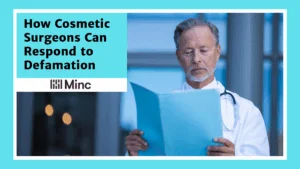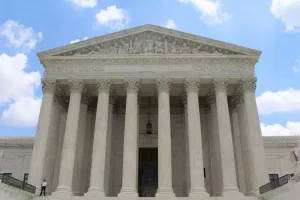
- Originally Published on July 17, 2025
How Cosmetic Surgeons Can Fight Back Against Defamation
The digital age has transformed how patients research and review medical providers, creating unprecedented challenges for cosmetic surgeons. Unlike other medical specialties, aesthetic surgery operates in a unique environment where patient expectations, elective procedures, and social media scrutiny converge to create perfect conditions for defamatory attacks. Understanding your legal options and taking decisive action can mean the difference between protecting your reputation and watching years of professional achievement crumble under false accusations.
Why Cosmetic Surgeons Face a Unique Defamation Risk
Recent research reveals that 51% of aesthetic plastic surgeons have experienced reputation denigration, with 78% facing pressure to refund fees through threats of negative reviews or complaints. This vulnerability stems from several interconnected factors that distinguish cosmetic surgery from other medical specialties.
Patients Expect Perfection
Unlike reconstructive procedures aimed at restoring function, aesthetic surgeries promise enhancement based on subjective beauty ideals. Patients frequently arrive with unrealistic expectations fueled by heavily filtered social media images and celebrity transformations that may be impossible to achieve through surgery alone.
When results don’t match these inflated expectations, even when surgery is technically successful, patients may feel justified in posting scathing reviews that characterize competent medical care as negligent or fraudulent. The subjective nature of aesthetic results compounds this challenge, as what one person considers successful, another might view as inadequate.
Procedures are Often Elective
Patients paying significant out-of-pocket costs for discretionary procedures often approach the transaction with a consumer mindset rather than a traditional medical patient perspective. When patients invest substantial personal funds in elective procedures, they’re more likely to demand refunds when dissatisfied and use public platforms to voice complaints when those demands aren’t met. The financial investment creates an entitlement that doesn’t exist in medically necessary procedures covered by insurance.
Reviews Are Often Written While the Patient is Still Healing Or Emotional
Patients often post reviews during the immediate post-operative period when swelling, bruising, and discomfort are at their peak. During this vulnerable healing phase, patients may experience buyer’s remorse or anxiety, leading to emotionally charged reviews that don’t reflect the final surgical outcome.
One Review Can Wreck a Brand
A single devastating review can have a disproportionate impact on a cosmetic surgeon’s reputation. Unlike other medical specialties where patients rely on physician referrals, cosmetic surgery patients frequently research providers online and heavily weigh patient reviews in their decision-making process.
Search engine algorithms often prioritize recent, detailed content, meaning a comprehensive negative review may appear prominently in search results for months or years. The visual nature of cosmetic surgery makes practices particularly vulnerable to dramatic before-and-after photos or graphic descriptions that can go viral.
Not All Negative Reviews Come From Patients
Research shows that 29% of cosmetic surgeons have experienced denigration from other medical professionals. Peer-to-peer defamation often stems from professional jealousy, disagreements over techniques, or direct competition for the same patient base.
Competitor surgeons may post anonymous negative reviews, spread rumors through professional networks, or make disparaging comments to mutual colleagues.
The Devastating Personal Impact on Surgeons
Beyond professional and financial consequences, defamatory attacks take a severe personal toll on cosmetic surgeons. A 2022 study published in Aesthetic Surgery Journal revealed that 32% of surgeons who experienced defamation reported significant mental health impacts, including anxiety, insomnia, depression, and loss of confidence. Additionally, 10% experienced physical health consequences from stress.
The ripple effects extend to patient care quality. The study showed that 22% of surgeons reduced procedures offered following defamatory attacks, while 20% began seeking more second opinions for legal protection. This defensive medical practice increases healthcare costs and can deny beneficial treatments to appropriate candidates. Most troubling, 67% of surgeons reported receiving no support from professional medical organizations when facing defamatory attacks.
When Do Patient Reviews Become Defamatory?
Not every negative review constitutes defamation. Understanding the legal distinction between protected opinion and actionable defamation is crucial for cosmetic surgeons considering legal action. The law protects patients’ rights to express honest opinions about their medical care while providing remedies when false statements cause reputational harm.
Required Elements of a Defamation Claim
For a negative review to constitute actionable defamation, it must meet specific legal criteria. The statement must be false, presented as fact rather than opinion, published to a third party, and cause reputational harm. In cosmetic surgery reviews, defamatory statements often include false claims about a surgeon’s qualifications, fabricated accounts of medical negligence, or knowingly inaccurate descriptions of procedures.
The distinction between protected opinion and actionable defamation can be nuanced.
A patient stating “I didn’t like my results” expresses protected opinion, while claiming “Dr. Smith was drunk during my surgery” presents a factual assertion that, if false, constitutes defamation. Reviews posted immediately after surgery making definitive claims about final results may be considered false if they don’t account for normal healing processes.
Understanding Defamation Per Se in Aesthetic Medicine
Defamation per se represents statements so inherently harmful that damages are presumed without requiring proof of specific financial losses. In the medical context, accusations of professional incompetence, criminal behavior, or ethical violations typically qualify as defamation per se.
For cosmetic surgeons, defamation per se commonly includes false claims about a lack of proper medical licensing, performing procedures while impaired, sexual misconduct during treatment, deliberately causing harm, or operating without proper facilities.
How Cosmetic Surgeons Can Fight Back
When facing defamatory attacks, cosmetic surgeons have several legal options ranging from informal resolution to formal litigation. The key is acting quickly and strategically to preserve evidence, protect your reputation, and pursue appropriate remedies through the guidance of experienced legal counsel.
Meticulously Preserve Evidence
The ephemeral nature of digital content makes immediate evidence preservation critical. Screenshots, archived web pages, and documented timestamps create the foundation for successful legal action. Comprehensive evidence collection must document the broader context, including the reviewer’s identity, patient history, treatment timeline, and any communications between the patient and practice.
Technical aspects may require specialized knowledge to ensure court admissibility. This includes capturing metadata, IP addresses, and platform-specific information using legally sound methods. Social media profiles, related posts, and patterns across multiple platforms can reveal important information about the defamer’s motivations and credibility.
Hire Experienced Legal Counsel
Medical defamation cases demand specialized legal expertise that general practitioners cannot provide effectively. Modern defamation attacks against cosmetic surgeons primarily occur online across multiple platforms, including Google reviews, social media, medical rating sites, and patient forums. This digital landscape requires attorneys who have a specific understanding of online defamation law, internet jurisdiction issues, and digital evidence preservation.
Experienced online defamation attorneys bring established relationships with digital forensics experts, reputation management specialists, and technical consultants who understand how search engines, social media algorithms, and review platforms operate. They understand the unique challenges of internet-based attacks, including how to unmask anonymous reviewers, navigate platform removal procedures, and coordinate multi-platform response strategies.
Specialized counsel also understands the timing of litigation to minimize patient care disruptions, manages parallel regulatory investigations, and balances aggressive legal action with the professional image expected of medical practitioners. The investment in experienced online defamation representation often pays dividends through more efficient resolution, better platform relationships for content removal, and reduced risk of costly procedural mistakes in the complex world of internet law.
Attempt Removal Through the Platform the Content is Posted
Most major review platforms maintain policies prohibiting defamatory content, but enforcement varies significantly and requires strategic engagement. Successful removal depends on understanding each site’s specific policies, reporting procedures, and the types of evidence platform moderators find compelling.
Effective platform engagement requires presenting clear policy violations with comprehensive supporting documentation, such as evidence of fake accounts, coordinated attacks, or content violating medical misinformation guidelines. However, removal efforts should be coordinated with the overall legal strategy, as premature attempts can alert defendants to potential litigation.
Strategic Negotiation
Many defamation cases can be resolved through strategic negotiation without the time, expense, and public exposure of formal litigation. Effective negotiation requires understanding the motivations behind defamatory attacks and whether they stem from genuine dissatisfaction, unrealistic expectations, or malicious intent.
Cease and Desist Letters & Retraction Demands
Well-crafted cease and desist letters serve multiple strategic purposes beyond demanding content removal. They provide formal legal notice, create opportunities for early resolution, establish a record of the defendant’s response for subsequent proceedings, and demonstrate reasonable resolution attempts before filing suit.
Effective letters must strike a balance between firmness and professionalism, clearly articulating legal violations while offering reasonable opportunities for voluntary compliance. Retraction demands should specify exactly what actions are required, including the removal of specific content, the publication of corrections, and binding commitments to refrain from making future defamatory statements.
File Suit If Necessary
When other methods fail, formal litigation may be necessary to protect professional reputation and deter future attacks. Successful medical defamation litigation can provide powerful remedies, including monetary damages, court orders requiring the removal of content, and injunctions preventing future defamatory statements.
Beyond compensation, litigation sends a strong deterrent message that false attacks will have serious legal consequences. Courts generally accommodate physicians’ scheduling needs to minimize practice disruption. While the process may generate additional publicity that requires strategic management, successful lawsuits can vindicate a professional reputation and establish important legal precedent for the protection of your practice.
When the Reviewer is Anonymous
Anonymous defamation presents unique challenges but is not insurmountable with a proper legal strategy. When facing anonymous attackers, attorneys can file what is called a “John Doe” lawsuit—a legal action against an unknown defendant that allows courts to order internet service providers and platforms to reveal the identity of the anonymous poster.
Success depends on acting quickly before identifying information is automatically deleted and presenting legally sufficient claims to justify unmasking. Once anonymous defendants are identified, the full range of legal remedies becomes available, including monetary damages and injunctive relief to prevent future defamatory conduct.
What to Consider Before Suing for Defamation
Before pursuing formal litigation, cosmetic surgeons must carefully weigh potential benefits against inherent risks and costs. While legal action can provide powerful remedies, it also carries risks that must be evaluated in the context of your specific situation and long-term professional goals.
Potential for Public Backlash or Media Attention
Defamation litigation involves public court filings that can generate unwanted media attention and social media discussion. The Streisand Effect—where attempts to suppress information actually increase its visibility—represents a real risk that must be carefully evaluated, particularly in high-profile cases.
However, research suggests inaction carries significant risks. Studies show that 53% of surgeons who experienced defamatory attacks faced repeat incidents, indicating that failure to respond decisively often encourages additional attacks rather than allowing controversies to fade naturally.
Risk of a SLAPP Counterclaim
Some defendants may file Strategic Lawsuits Against Public Participation (SLAPP) counterclaims, arguing that your defamation lawsuit is intended to silence their free speech rights. While many states have anti-SLAPP statutes designed to protect legitimate defamation plaintiffs, these laws vary significantly and can complicate litigation strategy.
SLAPP counterclaims can increase legal costs, extend litigation timelines, and create additional procedural hurdles. However, strong defamation cases with clear evidence of false statements typically withstand SLAPP challenges. Experienced defamation counsel can assess SLAPP risks in your jurisdiction and develop strategies to minimize exposure while pursuing legitimate claims.
Why You Should Not Handle This Alone
The complexity of medical defamation cases, combined with the unique professional and regulatory pressures faced by cosmetic surgeons, makes professional legal representation essential. Attempting to handle defamatory attacks without experienced counsel often leads to costly strategic mistakes and increased exposure to additional legal risks.
HIPAA Exposure
Medical defamation cases pose significant HIPAA compliance risks, which can result in federal penalties exceeding the original defamation damages. Responding to defamatory reviews often requires referencing protected health information.
Experienced legal counsel understands how to craft effective responses while maintaining strict HIPAA compliance. HIPAA violations can result in substantial federal fines and professional licensing sanctions.
Escalation by the Reviewer
Research reveals that defamatory attacks often follow predictable escalation patterns, starting with private complaints that progress to online reviews, social media campaigns, traditional media coverage, and formal regulatory complaints. This multi-platform escalation requires a coordinated legal strategy that anticipates attacks across multiple venues simultaneously.
Self-represented responses often inadvertently provide ammunition for escalation by creating new controversies or revealing strategic weaknesses that sophisticated attackers can exploit. Professional representation helps maintain strategic discipline and avoid responses that fuel additional attacks.
Looking Defensive or Combative
Public responses require careful calibration to avoid appearing defensive or unprofessional in ways that can damage relationships within the medical community. The medical profession’s ethical obligations create narrow parameters for appropriate responses.
Minc Law Can Help
Defamatory reviews and online attacks present complex challenges for cosmetic surgeons. These situations require careful handling, balancing legal, ethical, and reputational considerations. It is important to work with a team that not only understands the law but also the realities of your profession.
Minc Law is the only law firm in the United States devoted exclusively to internet defamation and digital reputation issues. We have been at the forefront of this field for over a decade, representing numerous plastic and cosmetic surgeons in resolving online defamation matters. Our experience spans thousands of cases, giving us a clear understanding of what works, what to avoid, and how to move forward strategically.
If you are facing reputational harm, we are here to help. A consultation with an experienced attorney can offer clarity, outline your options, and provide the steady guidance needed to protect what you have built. To get started, you can call us at (216) 373-7706 or submit a request through our online contact form below.
Get Your Free Case Review
Fill out the form below, and our team will review your information to discuss the best options for your situation.
This page has been peer-reviewed, fact-checked, and edited by qualified attorneys to ensure substantive accuracy and coverage.



